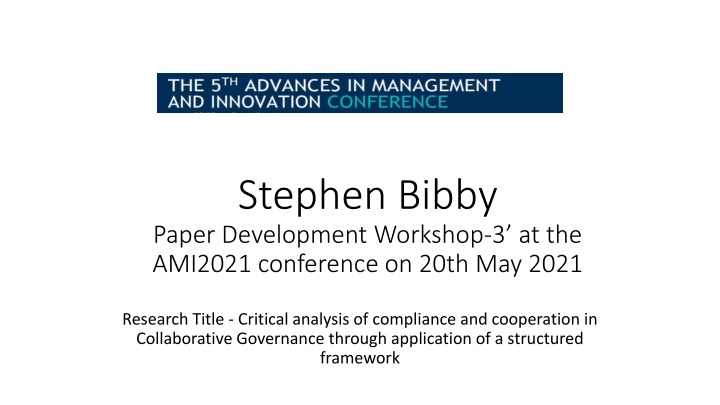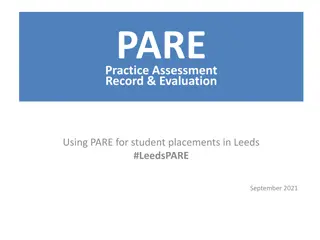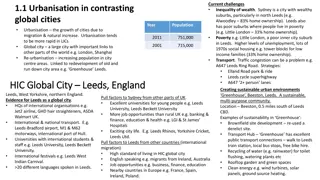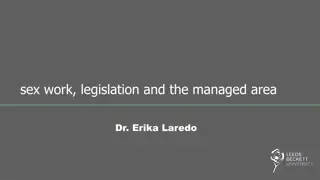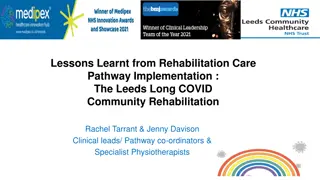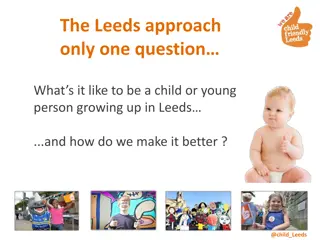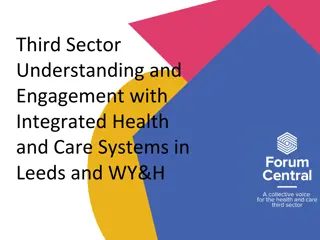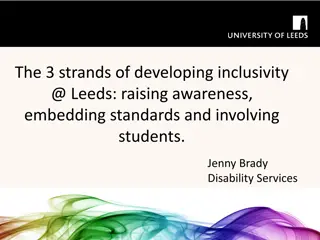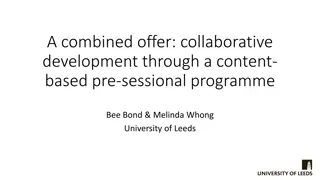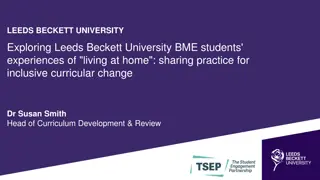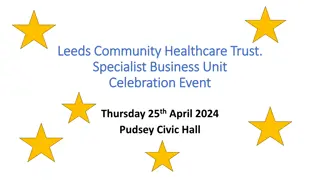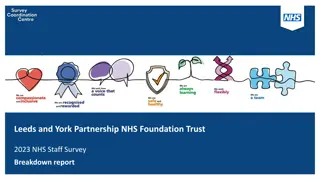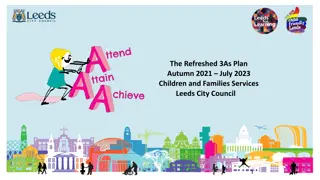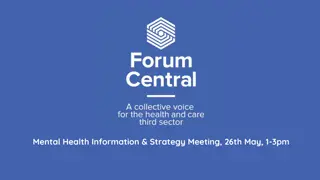Q-Step Programme at University of Leeds
Q-Step Programme at the University of Leeds is a £19.5 million initiative aimed at promoting a significant advancement in quantitative social science training. Launched as a strategic response to the scarcity of quantitatively-skilled social science graduates, the program is supported by the Nuffield Foundation, the ESRC, and HEFCE. It encompasses specialist undergraduate programs, work placements, and pathways to postgraduate study, with a focus on enhancing quantitative skills among students. The program also involves collaborating with schools and employers to share expertise and resources across the higher education sector.
Download Presentation

Please find below an Image/Link to download the presentation.
The content on the website is provided AS IS for your information and personal use only. It may not be sold, licensed, or shared on other websites without obtaining consent from the author.If you encounter any issues during the download, it is possible that the publisher has removed the file from their server.
You are allowed to download the files provided on this website for personal or commercial use, subject to the condition that they are used lawfully. All files are the property of their respective owners.
The content on the website is provided AS IS for your information and personal use only. It may not be sold, licensed, or shared on other websites without obtaining consent from the author.
E N D
Presentation Transcript
Stephen Bibby Paper Development Workshop-3 at the AMI2021 conference on 20th May 2021 Research Title - Critical analysis of compliance and cooperation in Collaborative Governance through application of a structured framework
A Aim im To fill a gap in knowledge and practice by undertaking a critical analysis of compliance and cooperation arising from power and trust relationships in situations of business collaboration The research tests whether a structured approach slippery slope method applied to contrasting collaborative situations, thus far applied to tax and shared consumer service, can contribute to improved business collaboration outcomes.
Background Improved outcomes where collaboration takes place may feasibly come from the recognition that power and trust relationships, often unequal from the start, are overlooked and should be managed as part of a collaborative system A systematic review of literature shows that whilst the detailed address to both power and trust singularly has been undertaken, a framework that brings both together as a means of analysis and improvement in collaborative arrangements outcomes has not been developed
A framework applied to taxation policy the slippery slope (Gangl et al; 2015; Kirchler et al 2007) Developed to help frame appropriate actions to collect taxes and consists three dimensions 1. Trust in the relevant authorities 2. power of the authority 3 tax payment (degree of voluntary or coerced participation). The dynamic effect of trust and power is that tax payments are more easily collected where trust is high and also where draconian measures (high power) is applied. However, the draconian measures lead to reductions in trust and incentives to avoid paying tax and 'resistance'. The 'slippery slope' framework therefore positions power and trust with enforced or voluntary compliance. It is the contention of the research the same principle needs to be tested for collaborative projects as power and trust are equally applicable as shown in the literature review but have never been empirically explored in this context.
Methodology The research will develop and refine a detailed methodology for primary data collection method to test the slippery slope based on 3 collaboration projects agreed with the Cardiff Capital Region programme. Project 1 Industry sector cluster programme - Project 2 Innovation challenge fund Project 3 Skills CCR Graduate Scheme Primary data collection will be by quantitative electronic questionnaire to obtain baseline information across the respondents followed up by semi-structured interviews Data will be entered into Microsoft excel and then uploaded to SPSS. ANOVA test will be undertaken to test whether one initiative is better than the others and the discussion of the data will address what these reasons might be. Microsoft excel will help outline the descriptive statistics whilst SPSS can be used to test the significance of the results and cross tabulate responses.
Publishing Plans Dissertation DMan January 2023 Subsequent papers? Policy and politics Public Management an International Journal of Research and Theory Public Management Review
References Ansell, C. and Gash, A. (2012) 'Stewards, mediators, and catalysts: Toward a model of collaborative leadership1', The Innovation Journal, 17(1), pp. 2-21. Chris Huxham , S. V., C. Huxham & C. Eden (2000) 'The Challenge of Collaborative Governance', Public Management an International Journal of Research and Theory, 2:3, pp. 337-358. Emerson, K., Nabatchi, T. and Balogh, S. (2012) 'An Integrative Framework for Collaborative Governance', Journal of Public Administration Research and Theory, 22(1), pp. 1-29. Gangl, K., Hofmann, E. and Kirchler, E. (2015) 'Tax authorities' interaction with taxpayers: A conception of compliance in social dilemmas by power and trust', New Ideas in Psychology, 37, pp. 13-23. Hofmann, E., Hartl, B. and Penz, E. (2017) 'Power versus trust what matters more in collaborative consumption?', The Journal of services marketing, 31(6), pp. 589-603. Horak, S. and Long, C. P. (2018) 'Dissolving the paradox: toward a Yin Yang perspective on the power and trust antagonism in collaborative business relationships', Supply chain management, 23(6), pp. 573-590. Huxham, C. (1996) Creating collaborative advantage. London: London : SAGE. Huxham, C., Vangen, S., Huxham, C. and Eden, C. (2000) 'The Challenge of Collaborative Governance', Public Management: An International Journal of Research and Theory, 2(3), pp. 337- 358. Kirchler, E., Hoelzl, E. and Wahl, I. (2008) 'Enforced versus voluntary tax compliance: The slippery slope framework', Journal of Economic Psychology, 29, pp. 210-225. Purdy, J. M. (2012) 'Framework for Assessing Power in Collaborative Governance Processes'. Ran, B. and Qi, H. (2018) 'Contingencies of Power Sharing in Collaborative Governance', The American Review of Public Administration, 48(8), pp. 836-851. Ran, B. and Qi, H. (2019) 'The Entangled Twins: Power and Trust in Collaborative Governance', Administration & Society, 51(4), pp. 607-636. S rensen, E. and Torfing, J. (2009) 'Making Governance Networks Effective and Democratic Through Metagovernance', Public Administration, 87(2), pp. 234. Welsh Government (2020) Regulations to establish Corporate Joint Committees (CJC s) Number WG41255 Welsh Government 12 October 2020 Vangen, S. and Huxham, C. (2003) 'Nurturing Collaborative Relations: Building Trust in Interorganizational Collaboration', The Journal of Applied Behavioral Science, 39(1), pp. 5-31.
